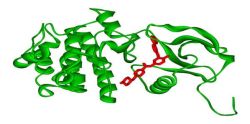Recent research finds that gene mutations that cause people to have unnaturally short telomeres may be connected to both pulmonary fibrosis and emphysema.
Jonathan Adler, a biologist at Brigham Young University (BYU) believes he knows when most of us are going to die. He doesn't know the exact day or time but based on his research, he is confident that the tiny biological clocks attached to our chromosomes can predict life expectancy. The shorter the telomeres, the shorter the lifespan. Shorter telomeres can also indicate chances of bone marrow failure, liver disease, skin disease and lung disease.
The research has been co-authored by Alder and collaborators at John Hopkins University and has been published in the Journal of Clinical Investigation and Chest.
Scientists have been tinkering with telomeres for decades but now a research team Alder is part of, has found a link to telomeres and lung disease.
Telomeres are the protective tip of our chromosomes and each time a cell divides and replicates, the DNA at the end of the telomeres shorten. This cell division happens throughout our life and the telomeres get shorter and shorter as we age. The point when telomeres run out is the time when the cell dies and leads to disease.
While some scientists know of ways to lengthen telomeres, the problem is that telomeres that keep their length can lead to other complications including cancer.
"This is a definite Goldilocks situation," Alder said. "Too little, you age prematurely; too much, you could get more serious diseases. You need to be just right."
Emphysema is one of the leading causes of death in the US. During this research, the team found that a fraction of individuals who develop severe emphysema have mutations in one of the genes that is responsible for maintaining telomeres. Mutations in telomeres genes are also known to cause pulmonary fibrosis.
Alder points out that these telomere mutations can be passed down the line and offsprings can often start off with shorter telomeres. That is why the disease could get worse with each passing generation and can also begin at an earlier age.
Lung disease is the third most common cause of death in the US and that is why telomere research can have significant public health benefit in this disease area. Alder and his team now plan to focus on finding out why short telomere length puts people at greater risk for lung disease.
Source: Brigham Young University
Image Credit: Brigham Young University
References:
- Jonathan K. Alder et. al. 2014, Exome sequencing identifies mutantTINF2in a family with pulmonary fibrosis. CHEST Journal,
- Susan E. Stanley et al. 2014. Telomerase mutations in smokers with severe emphysema. Journal of Clinical Investigation, 2014; 125 (2): 563.























